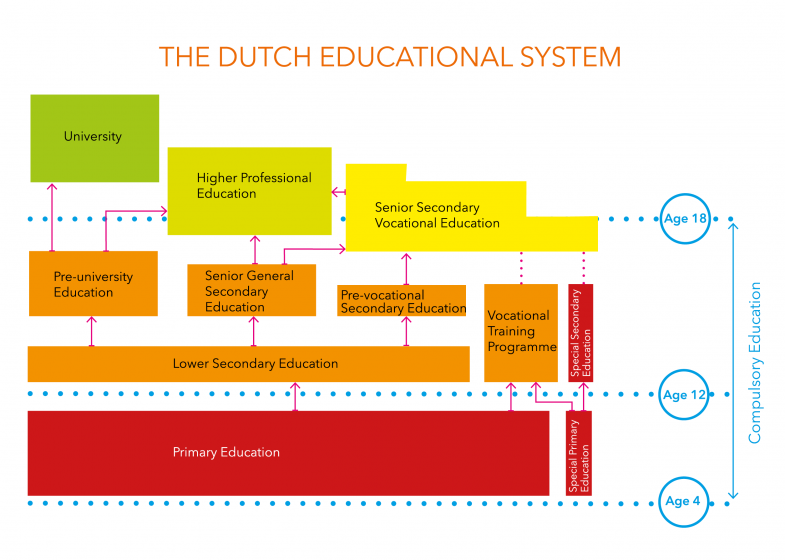Studying in the Netherlands
Introduction
Dutch educational institutions together offer some 1,402 international study programmes and courses, making the Netherlands an attractive destination for students from all over the world. For a small country like Holland, an international orientation – including in the field of education and training – is a must for survival in our increasingly internationalized world.
The Dutch education system is interactive and focuses on teamwork, which makes it easy to meet other international students. Studying in the Netherlands means developing an open mind and increasing your international orientation.
The Netherlands has compulsory education from age 5 to 18 (or 16 as a study is completed which has given the student adequate professional skills to start as a professional in the labour market).
Pupils attend primary or elementary school from age 4 to age 12. After that they continue their education at secondary school minimally until age 18; which indicates one of three tracks in the Dutch educational system.
From pre-vocational secondary education (VMBO), general secondary education (HAVO) and pre-university education (VWO), you have access to either the senior secondary vocational education (MBO), the higher professional education or university depending on your prepatual educational level. Lentiz has it’s own senior secondary vocational courses which prepare you for a future in the “green” sector and form a combination of learning and working. You choose where you want to learn and spend most of the time: at school or in a real company.
The vocational track starts with VMBO, which is seen as the first level of secondary education and lasts four years. Successfully completing VMBO results in a basic level vocational degree and/or gives access to higher (secondary) levels vocational education.
Completion of second level of vocational education results in professional skills and gives access to further study a university of applied science. The medium level HAVO lasts five years. After completion a student can attend a school for applied science.
A school for applied science awards professional bachelor degrees. A degree at a school for applied science gives access to the university system. The highest level of high school education is VWO, which lasts six years, completion of which allows students to attend a university.
University consists of a three year bachelor’s degree, followed by a one or two year master’s degree. A master’s degree is required to start a four year doctoral degree. Doctoral candidates in the Netherlands are temporary employees of a university.

Our courses are comprehensive, up to date and tailored to the wishes of students and businesses. Senior secondary vocational courses are offered at six schools in Maasland, Middelharnis, Barendrecht, Bleiswijk, Schiedam and Naaldwijk. Our policy is to keep small-scale schools with a personal touch, an eye for social development and an approach aimed at the individual.
Are you interested in our courses? Check our website (in Dutch). Use the translate-option in your browser to get the latest information about our courses in your own language.
At Lentiz, practice is the basis of learning. During the work placements our students gain a lot of experience in their field. This experience is obtained by working in various modern companies like the auction, horticulture and landscaping companies, horse firms, farms, food industry and environment control businesses.
Work placement
At Lentiz you are not at school all the time. Our programmes are characterised by much practice, field trips and work placements. Work placements in the Dutch vocational education sector are called “BPV “.
At the workplace
Practice is important for learning. Therefore, the work placement is a large and important part of the senior secondary vocational education programmes. You gain experience in recognised training companies. During your work placement you become familiar with the atmosphere in a company or institution. You learn to put theoretical knowledge into practice while you are guided by a supervisor or mentor in the training company.
Involved parties
The supervisor is responsible for coaching you at the workplace and teaching you the agreed skills. You will be guided by the school as well. The school will be in contact with you and the training company and is at the end responsible for the overall training course.
Acknowledged training companies
Companies that want to train students must be acknowledged by the Dutch Knowledge Centre for Businesses and Vocational Education (KBB). This applies to both the school-based route with full-time education and work placements (BOL) and the work-based route in which apprenticeship students combine work and study (BBL). For instance, a qualified supervisor must be present and the student must be able to practise all the required skills in the company. This ensures the quality of learning during the work placements.